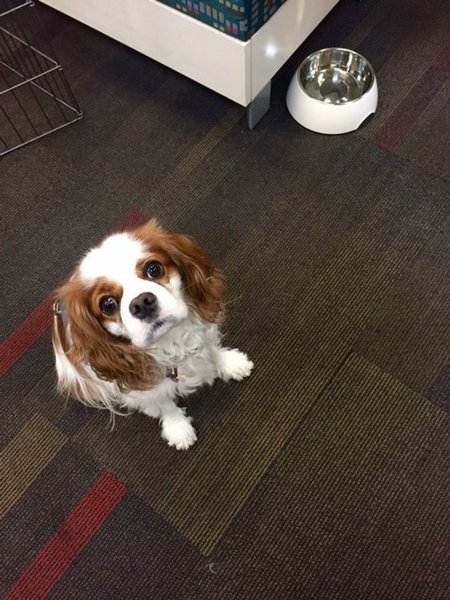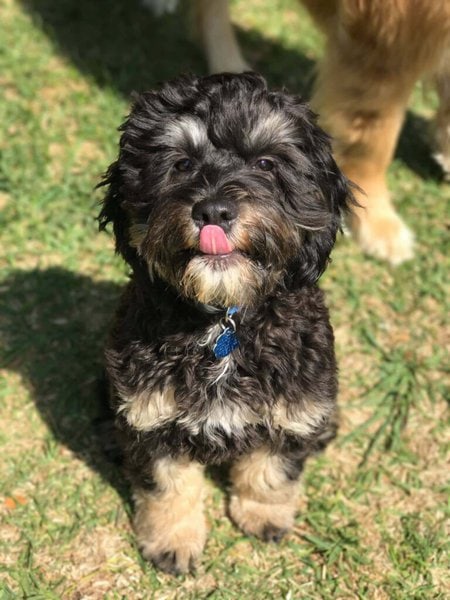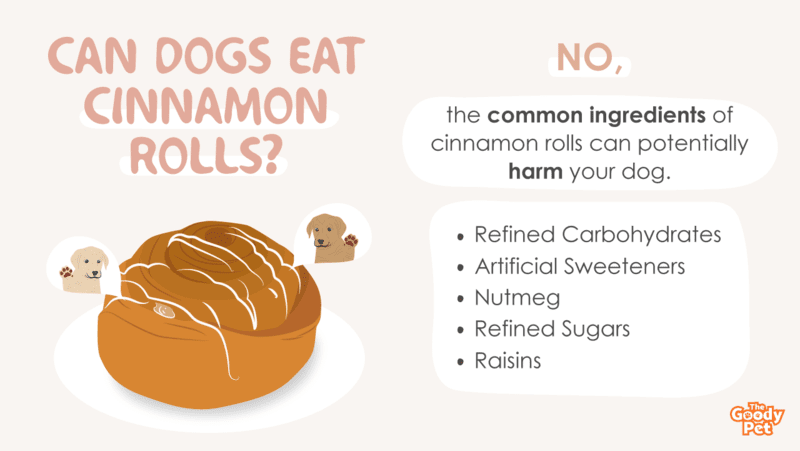You’ve made it a habit to share your human treats with your pup. This time you got some mouth-watering cinnamon rolls, and you were just about to toss one to your dog when a question popped into your mind – can dogs eat cinnamon rolls?
Unfortunately, dogs cannot eat cinnamon rolls. Although tasty and nutritious, cinnamon rolls contain several ingredients harmful to canines, while cinnamon itself is not toxic to dogs. The presence of components such as raisins, icing sugar, and nuts, in the treats can lead to serious health issues even when ingested in seemingly small quantities.
In this article, we will be digging deep to learn more about giving dogs cinnamon rolls. We will begin by examining whether cinnamon is bad for dogs to eat. Next will be to discover if this common spice is harmful for dogs to smell. We will also spare some time to see whether or not you can feed your dog baked cinnamon. Lastly, we will seek to know what you should do when your dog eats cinnamon rolls. I bet all these are the questions that you’ve been asking yourself, right? If yes, then you couldn’t be luckier to have found this article. Just keep reading to the end!
Are Cinnamon Rolls Good For Dogs?

No, cinnamon rolls are not good for dogs. Although their cinnamon content is considerably minimal to cause any effect on your pooch, these rolls typically feature other ingredients that can potentially harm your pet.
What Ingredients Are Toxic To Dogs?
The ingredients commonly found in cinnamon rolls are toxic to dogs and will include refined carbohydrates, artificial sweeteners, nutmeg, refined sugars, and raisins.
When ingested, they will cause the following conditions:
- Stomach upsets
- Diarrhea
- Obesity
- Diabetes
- Kidney disease
So, as you can see, giving your pup cinnamon rolls could mean ushering them into a lifetime of suffering. If you aren’t sure about what these baked rolls actually contain, don’t feed it to your dog.
Among those aforementioned ingredients, there are, of course, others that will affect your dog in a similar manner in terms of toxicity, but these are the ones you are most likely to find in cinnamon rolls and other baked goods.
What About Baked Cinnamon Goods?
No, dogs should not eat baked cinnamon goods as well. Examples of these goods, such as cinnamon bread, cinnamon cookies, cinnamon toast crunch, and among others.
In fact, any baked cinnamon goods you buy can contain at least a few of the above toxic substances, especially nutmeg and raisins. Most of these toxins will affect your dog even when taken in small quantities.
With that said, avoid sharing your baked cinnamon snacks with your adorable Fido – not even when your pup comes to you wagging their tail! If you must give your pooch baked cinnamon goods, then opt to play it safe and become a home baker!
Homemade Cinnamon Rolls For Dogs
To keep off trouble, we recommend that you consider selecting the right baking recipe and start making cinnamon rolls for your dog in your home kitchen.
That way, you can decide what ingredients to bring in and the amount of cinnamon to use. And please, always keep the cinnamon content minimal.
For instance, cinnamon has anti-inflammatory properties that help in arthritis, joint pain, swelling, and other issues. It also improves the heart health of your dog and regulates blood sugar levels.
Homemade cinnamon rolls will not only serve as a safe and tasty treat for your dog but will also offer them a plethora of health benefits associated with the spice. Then, what is going to happen if your dog eats the cinnamon rolls bought from bakeries and shops?
What Happens When A Dog Eats Cinnamon Rolls?

What happens when a dog eats cinnamon rolls containing toxic substances depends on the nature of the toxin and the degree of the toxicity. The size of the dog will also come into play when considering the effects of toxicity.
For instance, all in equal quantities, Xylitol is more toxic than chocolate and other toxins you are likely to find in baked cinnamon rolls. Hence, treats containing more of this toxin are the most dangerous.
On the other hand, the weight of a dog affects the toxicity level. The larger the dog, the more the toxin it will take for signs to show up. The vice-versa is also true, and that means puppies and smaller dog breeds are more susceptible to poisoning.
Signs Of Toxicity After Eating Cinnamon Rolls
If your dog eats cinnamon rolls with toxic substances, you should notice a few changes in how they behave. Some of the common signs and symptoms of toxicity include:
- Lethargy
- Low blood sugar
- Incoordination
- Seizures
- Decreased activity
- Vasoconstriction
- Staggering
And so, as you can tell, cinnamon rolls don’t usually make the best friends with our furbabies. The side effects may appear minutes to hours after ingestion, depending on the toxicity level.
Again, what comes about may range from mild to severe, and at times, death. Nevertheless, unless you have a super-sensitive pup, it is highly unlikely that your dog will die from eating cinnamon rolls.
However, the cinnamon spice itself is not harmful to your dogs. We’ll get into that later in a bit, but first let’s see what we can do if our dogs accidentally ate some cinnamon rolls.
What Should You Do If Your Dog Ate Cinnamon Rolls?
If your dog ate cinnamon rolls containing harmful substances, the best thing to do is contact your vet. The dog doctor will know what to do and will help you get through the situation.
When you are sure that the cinnamon rolls had some harmful substances, don’t wait for signs to appear so that you can get in touch with the vet. Waiting will only make the situation more difficult to handle, especially when the side effects finally begin to show up.
The veterinarian may recommend taking a blood test, ultrasound, or X-ray to determine the best way forward and how to treat your dog. They may also ask you what happened and whether it was accidental or not. All that will be to help them determine the degree of toxicity.
And there you have it – cinnamon rolls can be fatal when ingested by our four-legged companions. Cinnamon is not the culprit, but it is because of the other ingredients that these rolls contain and that can be fatal to dogs when ingested, even in very negligible amounts.






